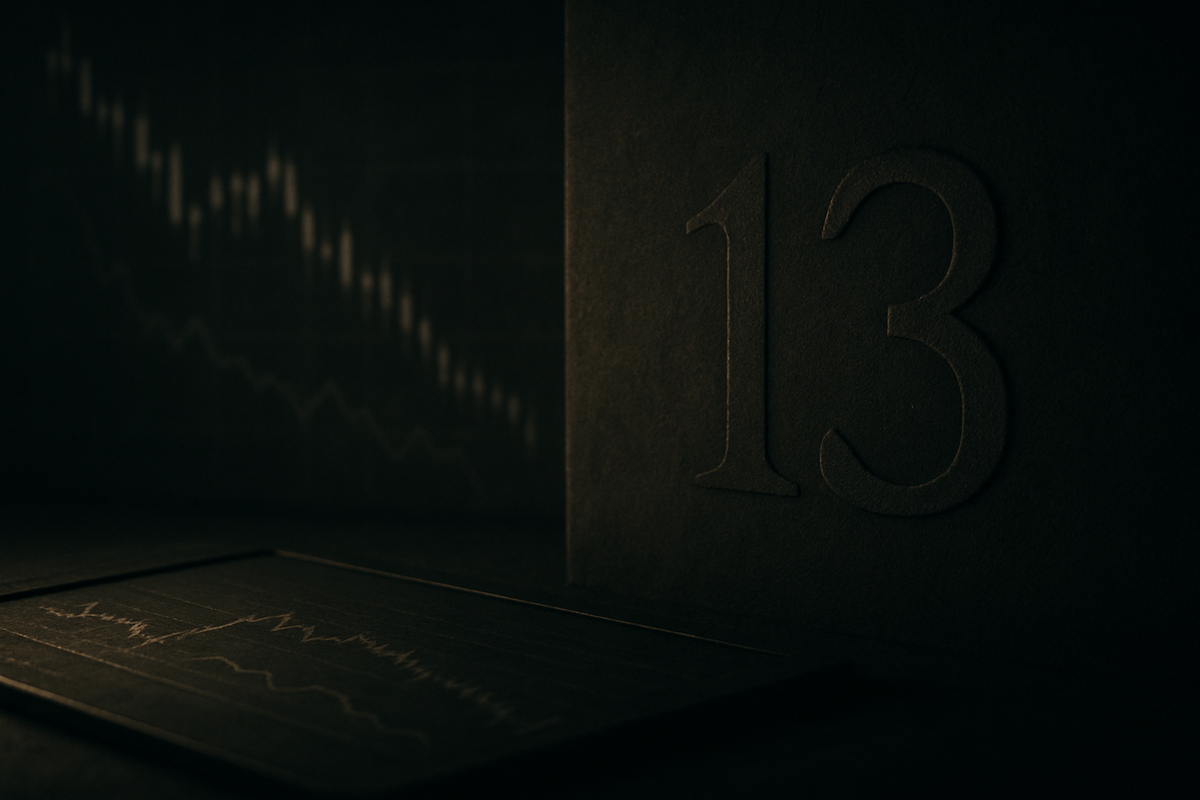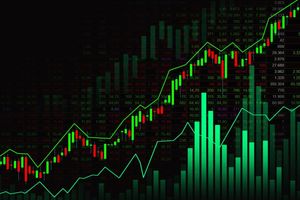
For centuries, Friday the 13th has been shrouded in a veil of superstition, a day many associate with bad luck and caution. While often dismissed as folklore, a body of financial research suggests that this ominous date might, in fact, cast a measurable shadow over global stock market performance. Studies delving into historical trading data indicate a recurring pattern of lower-than-average returns on these specific Fridays, challenging the tenets of rational market behavior and highlighting the subtle yet potent influence of investor psychology.
These findings present a fascinating anomaly in the efficient market hypothesis, suggesting that collective human superstition, rather than fundamental economic indicators, can sway market movements. The immediate implication for investors and market analysts is a need to consider the often-overlooked behavioral aspects that can introduce subtle biases and inefficiencies into an otherwise data-driven environment. While the effect may not be consistently drastic, its very existence offers a compelling glimpse into the interplay between human belief and financial reality.
The Unlucky Dip: Decades of Data Point to a Peculiar Trend
The notion that Friday the 13th could negatively impact stock market returns isn't merely anecdotal; it's a phenomenon that has been explored in several academic papers over the past few decades. Early groundbreaking research by Donald B. Keim and Robert F. Stambaugh in 1984, and a seminal paper by Kolb and Rodriguez in 1987, both observed significantly lower stock returns on Friday the 13th compared to other Fridays. These studies, examining U.S. markets, laid the groundwork for understanding how a non-fundamental factor could seemingly influence financial outcomes.
Further analysis, spanning periods from January 1950 to December 2007, reinforced these observations, noting that returns for Friday the 13th were significantly lower than for all other Fridays over a "long period." Interestingly, this effect wasn't uniform across all sub-periods, suggesting its intensity might fluctuate with broader market sentiment or other behavioral shifts. Beyond just the day itself, some research has even identified an "extended Friday the 13th effect," where returns on trading days prior to Friday the 13th, particularly before 1981, were also lower than normal. This points to a potential pre-emptive fear-related selling by superstitious investors anticipating the supposedly unlucky day.
More recent studies, analyzing data from 2000 to 2019, have also uncovered abnormal volatility on the trading days immediately surrounding Friday the 13th, and in some cases, significantly lower returns on the two trading days preceding it. This suggests that while the direct "Friday the 13th" dip might have become less pronounced in an era dominated by automated trading, the psychological anticipation and reaction to the date continue to manifest in subtle market shifts. Key players in this narrative are the academic researchers who meticulously sift through market data, and the behavioral economists who provide the theoretical framework for understanding these irrational market behaviors.
Who Wins, Who Loses: The Market's Superstitious Swings
The "Friday the 13th" effect, while impacting overall market returns, doesn't typically create distinct winners or losers among specific public companies in the same way a sector-specific news event might. Instead, its influence tends to be a broad, albeit subtle, drag on the entire market. Therefore, most public companies listed on exchanges like the New York Stock Exchange (NYSE) or NASDAQ (NASDAQ) might experience a marginal, temporary downturn in their stock price on these particular days, irrespective of their individual performance or news.
However, the companies that "lose" most are arguably those whose valuations are more sensitive to short-term investor sentiment or those with a higher proportion of retail investors who might be more susceptible to superstitions. Conversely, institutional investors and algorithmic trading systems, which are largely immune to such psychological biases, might actually "win" by identifying and potentially exploiting these minor, predictable market inefficiencies. For instance, sophisticated quantitative funds might program their systems to account for such anomalies, potentially buying into dips caused by superstitious selling or adjusting their strategies accordingly.
In essence, the impact is less about individual corporate performance and more about the collective psychology of the market. Companies like Apple (NASDAQ: AAPL), Microsoft (NASDAQ: MSFT), or Amazon (NASDAQ: AMZN), while massive and fundamentally strong, would likely see their stock prices move in tandem with the broader market's superstitious dip, rather than experiencing a unique, company-specific adverse event. The real "losers" are perhaps the investors who allow superstition to dictate their trading decisions, potentially missing out on minor gains or incurring unnecessary losses due to irrational fear.
Broader Significance: Behavioral Finance in the Spotlight
The "Friday the 13th" effect, along with other calendar anomalies like the "January effect" or "Halloween effect," serves as a compelling case study for behavioral finance. It challenges the cornerstone of traditional financial theory – the Efficient Market Hypothesis (EMH) – which posits that asset prices fully reflect all available information and that it's impossible to consistently "beat the market" based on publicly available data. The persistence of a statistically significant, albeit small, negative return on a day associated with superstition suggests that psychological biases can indeed create temporary market inefficiencies.
This phenomenon highlights broader industry trends towards acknowledging the human element in financial markets. Beyond just "Friday the 13th," research into investor sentiment, cognitive biases, and herd behavior is increasingly influencing how financial institutions and regulators understand market dynamics. The potential ripple effects are subtle: while not triggering widespread panic, it reinforces the idea that market movements are not always purely rational. Competitors and partners might observe these micro-trends, but their core business operations are unlikely to be directly impacted by such a generalized, superstitious dip.
Historically, such anomalies have often been dismissed or attributed to data mining. However, the consistent findings across multiple studies, particularly from earlier periods, lend credence to the idea that investor psychology plays a role. Regulatory bodies, while not directly addressing "Friday the 13th" specifically, are increasingly aware of the need to protect investors from manipulative practices that exploit behavioral biases. The comparison to other calendar anomalies underscores that markets, despite their complexity, are still ultimately driven by human decisions, sometimes irrational ones.
What Comes Next: Adapting to the Psychological Undercurrents
Looking ahead, the "Friday the 13th" effect is unlikely to cause a seismic shift in global financial markets, particularly given the increasing dominance of algorithmic trading and institutional investors who are less prone to superstition. However, its continued presence in academic discourse serves as a reminder of the subtle behavioral undercurrents that can influence market movements. In the short term, individual investors who are aware of this phenomenon might choose to exercise extra caution or even look for minor buying opportunities if they believe the market is temporarily oversold due to irrational fears.
Longer term, the ongoing research into such anomalies will continue to shape the field of behavioral finance, prompting more sophisticated models that integrate psychological factors alongside traditional economic variables. Financial advisors and wealth managers might find it valuable to discuss such biases with their clients, educating them about the difference between fundamental market drivers and emotional reactions. This could lead to strategic adaptations focused on emotional resilience and disciplined, data-driven decision-making, rather than reacting to perceived "unlucky" days.
Potential market opportunities could emerge for quantitative funds that can accurately predict and capitalize on these micro-dips, though the magnitude of the effect often makes it challenging to generate substantial alpha. Conversely, the challenge lies in distinguishing genuine market signals from noise generated by collective psychology. As the financial landscape evolves, driven by AI and big data, the impact of human superstition might diminish further. However, the underlying human propensity for belief and fear will likely always remain a factor, albeit a less dominant one, in the complex tapestry of market dynamics.
Wrap-Up: Navigating the Superstitious Seas of the Market
The research into "Friday the 13th" and its negative impact on stock market returns offers a compelling narrative about the intersection of human psychology and financial markets. The key takeaway is that while fundamental economic principles and corporate performance are the primary drivers of long-term value, short-term market fluctuations can, at times, be influenced by collective human biases and superstitions. Early studies consistently identified significantly lower returns on these days, attributed largely to investor fear, confirmation bias, and pre-emptive selling.
Moving forward, the market will continue to be a battleground between rational analysis and emotional responses. While the "Friday the 13th" effect might be less pronounced in today's sophisticated, algorithm-driven markets compared to decades past, its historical presence serves as a potent reminder for investors. It underscores the importance of a disciplined investment strategy, one that prioritizes long-term goals and fundamental analysis over short-term emotional reactions or superstitious beliefs.
Investors should watch for ongoing research in behavioral finance, which continues to shed light on how cognitive biases impact decision-making. The significance of the "Friday the 13th" anomaly lies not in its potential to crash markets, but in its ability to illustrate the enduring human element within financial systems. It’s a testament to the idea that even in the most data-driven environments, the human mind, with all its quirks and beliefs, still plays a role in shaping financial outcomes.
This content is intended for informational purposes only and is not financial advice.





